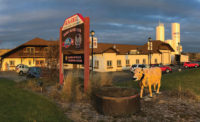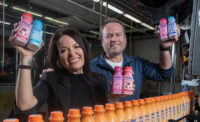Specialty cheesemaker Emmi Roth is serving up solutions
Specialty cheesemaker Emmi Roth is willing to innovate and take risks in its quest to meet the unique needs of its customers.

Pictured in the culinary center of Emmi Roth’s Monroe, Wis., creamery are (l to r) Tony Salathe, senior vice president of sales and marketing; Robert Frie, director of operations; Marc Druart, director of research and development; and Tim Omer, president and managing director. Photo by Vito Palmisano

Crafted in copper vats from locally sourced Wisconsin milk, the Roth Grand Cru lineup of washed-rind Alpine-style cheeses includes Original (pictured), Reserve and Surchoix offerings.

Roth 3 Pepper Gouda cheese meshes with the consumer trend toward bolder flavors.

Emmi Roth recently debuted a premium snack cheese line under the Roth brand.

Tim Omer, president and managing director, said Emmi Roth wants to be viewed as a solutions provider for its customers. Photo by Vito Palmisano

Roth Buttermilk Blue cheese is handcrafted in small batches.






Emmi Roth could be described as the Apple Inc. of the cheese-making world. Like Apple — especially in its early days — the Fitchburg, Wis.-based company is willing to innovate and take risks in its quest to create unique, high-quality products.
Formerly operating as Roth Käse USA Ltd., the company was acquired by Switzerland’s Emmi Group in 2009. Emmi Roth currently operates two creameries in Wisconsin, in Platteville and Monroe, where it creates award-winning specialty cheeses that go well beyond the standard offerings. It employs approximately 300 people within its creameries and headquarters.
Solution-minded
There’s a reason behind Emmi Roth’s commitment to innovation and risk-taking. The company aims to fulfill the unmet and evolving needs of its retail/specialty retail, foodservice and industrial customers.
“We want to be seen by our customers as solution providers,” explained Tim Omer, president and managing director. “If we’re just going to bring in another Swiss or another feta or another Gouda, at the end of the day, is that really going to change our customers’ businesses?”
As a solution provider, Emmi Roth must be able to help its customers pursue whitespace in the marketplace, Omer noted. Therefore, the company’s business model calls for listening closely to customer wants and needs and responding with custom solutions. For example, Emmi Roth might help a customer bolster its kosher cheese offerings or flavor-up a foodservice specialty via one of the washed-rind cheeses the company is known for.
“If the customer is looking for flavor, that’s something that we can really give compared to what else is out there,” he added. “Washed-rind cheeses really put the most amount of flavor in the smallest amount of cheese, and that’s really what the market is looking for.”
Talented cheesemakers are critical, of course, to Emmi Roth’s ability to offer the right solutions.
“I think our cheesemakers are just an amazing group of people,” Omer said. “They’re always looking to test the boundaries.”
But when it comes down to it, the company’s success can be attributed to collaboration across all of the company’s departments. And Emmi Roth’s size is a plus here, noted Heather Engwall, director of marketing.
“We’re small enough that we can work together with each department, so the marketing team works closely with R&D and our sales team and our quality teams,” she said. “We’re really trying to integrate each team to push products that we all believe will have success — not just driven from one department.”
And Emmi Roth’s team-based innovative solutions go beyond cheese; packaging gets plenty of attention, too.
“We do a ton of different packaging for our customers that fits what they actually need,” noted Tony Salathe, senior vice president of sales and marketing.
Specialty with scale
Over the years, Emmi Roth’s innovation-focused approach has resulted in a selection of highly unique specialty cheeses that it offers under three core brands — Emmi USA, Roth and Kindred Creamery — as well as a number of sub-brands. Cheese types range from washed-rind and semi-soft varieties to American-style, blue cheese and other artisan offerings. But the star among those cheeses is the Roth Grand Cru, which Omer likes to think of as its own brand.
Crafted in copper vats from locally sourced Wisconsin milk, the Roth Grand Cru lineup of washed-rind Alpine-style cheeses includes Original, Reserve and Surchoix offerings. They are aged four months-plus, six months-plus and nine months-plus, respectively.
Although all of the cheeses have been honored with multiple awards, the Roth Grand Cru Surchoix claims the highest honor. It was crowned World Champion in the Wisconsin Cheese Makers Association’s 2016 World Champion Cheese Contest — the first time since 1988 that a U.S.-made cheese won the title.
“It’s a really unique cheese to this country; nobody else is doing anything like it,” Omer said.
The award also has been a boon to sales, Salathe, added. He noted that an offshoot of the Grand Cru line, G4, is filling the needs of customers in industrial and alternative channels.
“It’s Grand Cru in a block form — rindless,” he explained. “So they don’t have to deal with the rind; they can just shred it and put it right into the application.”
Outside of the washed-rind space, Emmi Roth recently debuted a premium snack cheese line under the Roth brand, Salathe said. Available in creamy cheddar, creamy Gouda and creamy whole-milk mozzarella varieties, the lineup is offered in several multipack sizes to help grocery, club and convenience stores, as well as foodservice operators, meet the growing demand for such options.
“It’s a round portion-size piece of cheese,” Engwall added. “We’re really excited because it tastes really good. We’re marketing it toward that consumer that may not necessarily be snacking yet on cheese.”
Omer pointed out that Emmi Roth remains “open minded” on the innovation front. For example, the company routinely creates small batches of new recipes using a trial vat.
“I think that’s where our sweet spot is in the industry,” he said. “We can take those 70-pound small batches and turn them into truckloads. We’re artisanal with scale.”
But not every customer calls for scale. Emmi Roth also is able to take on small “onesie-twosie” projects, Omer noted.
“We want to be able to give the cheesemonger something that’s special and unique, and we’re willing to pay attention in a way that I don’t think the rest of the market is willing to do,” he said.
Preparing for growth
Emmi Roth’s mission to be a solution provider has resulted in impressive recent growth. In 2017 alone, the company’s sales saw a double-digit gain over the prior year, Omer said.
And going forward, Emmi Roth has “really aggressive” growth goals, via both organic expansion and acquisitions. In the eyes of its Swiss parent, Emmi Roth is the No. 1 market for growth globally, Omer explained.
“Emmi is in many different countries, but they really want to grow our business here exponentially,” he said. “You’re going to continue to see us expand and really invest.”
Although the company started out, in its previous incarnation, with a focus on the foodservice industry, the future will emphasize growth within the retail space, as well as growth of the company’s individual brands, Engwall noted.
The domestically produced Roth brand, in particular, has growth potential, she added. The brand’s packaging recently underwent a redesign to give it a brighter look that also plays up the Roth name.
“We see opportunity in the industrial side of the business, too, where the companies are looking for a lot of flavor in less product,” Omer added. “That really defines what we do well.”
Considering its dominant position in the washed-rind cheese category, Emmi Roth wants to build the category, too — for the good of the company and the good of the industry, Omer said. Therefore, it will be investing a lot of its resources and capital into doing so.
Because Emmi Roth has the ability to segregate the milk it sources, the company also plans to pursue more opportunities in organic, rBST-free, kosher, animal-humane and non-GMO offerings, Salathe noted.
That’s something that’s difficult for bigger cheese companies to pull off because it’s not efficient, Omer said.
“We always talk about being efficient in a non-efficient business because specialty cheese in general, with a lot of SKUs and not a lot of volume, has a lot of inefficiencies,” he said. “So we want to be able to take as much inefficiency out but still leave the special nature and character of the cheese there.”
In the near-term, growth plans will not require plant expansion, as the Platteville facility still has excess capacity, Omer said. Capacity increases also are being realized by efficiency gains.
As it grows, Emmi Roth is investing in initiatives to benefit the planet and employees, too. For example, a new wastewater treatment facility and solar panels are in the works for Emmi Roth’s Platteville facility, Omer noted.
“We’re also spending quite a bit of our money automating — trying to take a lot of the wear and tear off our people in regards to the bending and lifting and things of that sort,” he added. “That’s more on the packaging side.”
Marketing and advertising initiatives also will be critical to expansion. On the customer advertising side, Emmi Roth has shifted a lot of its focus to digital platforms such as Facebook and Instagram, Engwall said, and is using digital means to target consumers shopping at different retailers in specific regions of the country. And on the consumer advertising front, the company recently partnered with Ibotta, a mobile technology company that enables users to earn cash back on in-store and mobile purchases via its smartphone app.
Social media, meanwhile, looms large in consumer marketing, Engwall said.
“One thing I’ve learned over the years is to make sure you don’t just communicate what you think they want to hear; you give them what they want,” she said. “So we follow along with different posts and recipes and pairing ideas and depending on the reaction to those things, we then alter how our voice is presented to the consumer.”
The ultimate goal, Engwall noted, is to engage and interact with consumers in the name of growing Emmi Roth’s brands.
“We also work with influencers a lot to help get our messages out,” she added. “So they’ll create images and recipes for us and then put them on their social channels for their followers as well.”
Up to the challenge(s)
For Emmi Roth, the road to growth is not without its obstacles. The most significant of those is a very tight labor market.
To help address that issue, the company is working with the technical colleges in Platteville and Monroe to develop an apprentice program, Omer said. It is also investing a lot of time and effort into onboarding and training.
“We want to be the employer of choice,” he emphasized. “We’re doing a lot of work on communicating with our employees in regards to ‘What do you value?’ and ‘What’s important to you?’ — it’s really difficult because every one of them has a different something on the value spectrum.”
Aiding in employee retention is Emmi Operational Excellence, a program that empowers plant employees to suggest ways to be more effective and efficient. In 2017, the plant team that came up with and executed the best idea here was rewarded with a trip to Switzerland, Omer noted, to get a first-hand view of cheesemaking operations there.
“The people here in Monroe and Platteville are always intrigued by what’s going on over there,” he said. “So we want to do more exchange of ideas.”
Outside of the labor issue, Emmi Roth is challenged by the speed at which everything happens these days, said Robert Frie, director of operations.
“If you have a new customer that needs 2 million pounds a year, how soon can you start producing it? Getting the teams up to speed, whether it’s new equipment being implemented or a new recipe being developed, it’s a challenge in today’s industry,” he said.
What’s more, a completely new cheese requires about a year to get to market, noted Marc Druart, director of research and development.
“We cannot speed the curing process of the cheese,” he said. “The cheese has to cure for four, six months.”
Despite the challenges, Emmi Roth appears to be primed for continued success and growth. After all, specialty cheese consumption is on the rise, and Omer believes the United States is in the beginning of a “huge reconnaissance” when it comes to the appreciation of good food.
“I think we’re positioned very well because we make fantastic products, and we’re trying to demystify them for the buying public,” he says.
The company’s cheeses are made with milk sourced from local cooperatives representing mostly small dairy farms within a 60-mile radius. That reality also meshes well with consumers’ desire for transparency — another positive for the future, Engwall noted.
“We have nothing to hide,” she said. “We work closely with the sources, so I think we’re in a really good spot right now.”
Going forward, it will be the job of Emmi Roth’s management team to communicate that story, Omer stated.
“The story is incredible,” he said. “We just have to get more transparency because we’re doing all of the things that everyone’s trying to market. We’re walking the walk.”
Looking for a reprint of this article?
From high-res PDFs to custom plaques, order your copy today!















